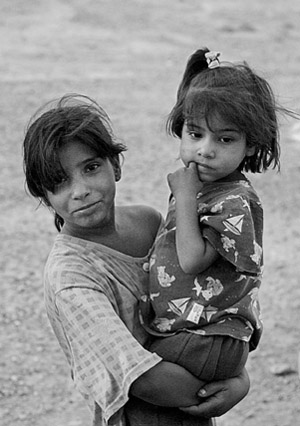|
Nobel Physicians Forecast
|
 |
|
5,000 Iraqi children are already dying each month due to economic sanctions. |
These are the findings of Collateral Damage: The Health and Environmental Costs of War on Iraq, issued Nov. 12 by International Physicians for the Prevention of Nuclear War (IPPNW), recipient of the 1985 Nobel Peace Prize.
The report was published to "prevent a human catastrophe," noted IPPNW Executive Director Michael Christ. "Neither Iraq's suspected weapons programs nor Saddam Hussein's tyranny provide moral or military justification for risking the lives of massive numbers of innocent civilians. We urge all nations to spare the innocent in favor of full and effective inspections."
Dr. Amy Sisley, a Professor of Surgery at the University of Maryland Medical System, explained, "In an era where images of combat are beamed from aircraft, it is too easy to forget about the direct, physical consequences of war. Bombs deafen, blind and blow apart people, riddling them with shrapnel, glass and debris. They collapse buildings on victims, including hospitals and clinics vital to treating the wounded. Unexploded ordinance left behind kills and maims, and battlefield toxins can contaminate the environment for decades."
Collateral Damage is based on projections from the 1990- 91 Gulf War, which led to nearly 200,000 casualties. It analyzes current U.S. combat scenarios and concludes that a new conflict will be much more intense and destructive than the first Gulf War.
Robert K. Musil, executive director of Physicians for Social Responsibility, summarized the public health impacts identified in the report. "Even so-called high tech war wrecks a society's human service systems and physical infrastructure by disrupting delivery of food, water, medicine and energy supplies. The loss of these necessities of life leads to infection, disease, malnutrition and starvation on a massive scale."
The aftermath of a U.S.-led attack could include civil war, famine, epidemics, millions of refugees and economic collapse, according to the report. Dr. Victor W. Sidel of the Albert Einstein College of Medicine and a past president of the American Public Health Association added, "As documented in Collateral Damage, a pre-emptive attack would exacerbate the disastrous levels of death, disease, disability and despair already present in Iraq. It would weaken the United Nations, weaken international law, weaken efforts to reduce terrorism and weaken the United States itself."
Michael Christ offered the group's recommendations to "prevent a human catastrophe"
Lynn Martin is communications director of International Physicians for the Prevention of Nuclear War. Collateral Damage is available at www.ippnw.org.
| Month in Review |
|---|
|
August 2010: |
| PAST articles |
Detoit: I Do Mind Empire (USSF Recap) “Bring the War (English) Time for Rebirth: (English) War Weariness, Military Heft, and (English) The Global Military Industrial Complex (English) A Stalled (English) Bush's Iraq “Surge”: Mission Accomplished? Iran: Let's Start with Some Facts Nuclear Weapons Forever (English) Time to End the Occupation of Iraq First-Hand Report from the Middle East (English) Haditha is Arabic (English) A Movement to End Militarism From Soldier to Students Not Soldiers Israel's "Disengagement" U.S. Soldiers Torture: Help Stop Torture — Be All You Can Be: OCTOBER 2006
|
|
War Times/Tiempo de Guerras is a fiscally sponsored project of the |